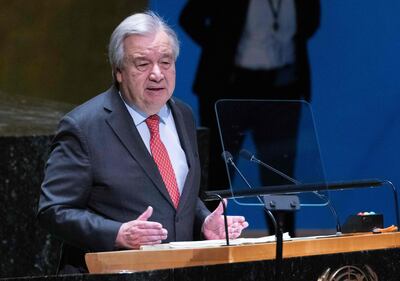Live updates: Follow the latest news on Israel-Gaza
UN Secretary General Antonio Guterres on Wednesday criticised Israel's military operations for bringing death and destruction to Gaza on a scale not seen since he started in his job eight years ago.
“Nothing justifies the horrific terror attacks launched by Hamas against Israel on October 7. Nor is there any justification for the collective punishment of the Palestinian people,” Mr Guterres said.
“Yet, Israeli military operations have resulted in destruction and death in Gaza at a scale and speed without parallel since I became Secretary General.”
Mr Guterres, who started his job in 2017, described the situation in Gaza a “festering wound” that threatens the entire region and he called for an immediate humanitarian ceasefire and the unconditional release of all hostages.
He said that the world has entered an “age of chaos” with a deeply divided Security Council “deadlocked by geopolitical fissures”.
“We are seeing the results: a dangerous and unpredictable free-for-all with total impunity,” Mr Guterres told the 193-member UN General Assembly, outlining his priorities for 2024.
With the war in Gaza entering its fifth month, Mr Guterres expressed alarm at reports of an imminent Israeli ground invasion of the southern city of Rafah which “would exponentially increase what is already a humanitarian nightmare with untold regional consequences”.
Israel vowed to eliminate the Palestinian militant group Hamas and launched air strikes and a ground offensive that have killed more than 27,700 people, mostly women and children, according to the Gaza Health Ministry.
Israeli Defence Minister Yoav Gallant said this week that the army would “reach places where we have not yet fought … right up to the last Hamas bastion, which is Rafah”.
The UN Secretary General’s spokesman Stephane Dujarric told reporters since the onset of the Gaza conflict, “civilians have been told for their own safety to move south progressively. And now they're in a last little corner."
"If the fighting that we've seen in the north in the center of Gaza moves to Rafah the consequences would be catastrophic and almost too catastrophic to imagine," he added.

Mr Guterres, who is in his second and final five-year term, called for reform of the Security Council, stressing that this is not the first time it has been divided but “it is the worst”.
He said that unlike during the Cold War, when “well-established mechanisms helped manage superpower relations,” those mechanism are missing “in today's multipolar world”.
“Today’s dysfunction is deeper and more dangerous,” he said. “Our world has entered an age of chaos.”
He said that the Security Council needs the capacity to make and carry out decisions, and should be more inclusive.
“It is totally unacceptable that the African continent is still waiting for a permanent seat,” he said.
In his speech, Mr Guterres also called for the council’s working methods to be updated so that it can make progress, “even when members are sharply divided”, and in light of global conflicts “stoking further inequalities and injustice.”
He noted that trade through the Suez Canal is down by 42 per cent since the start of Houthi attacks on shipping in the Red Sea more than three months ago.
“Trade via the Panama Canal is down 36 per cent in the past month, because of low water levels – a by-product of the climate crisis,” he added.
Mr Guterres urged world leaders to use the Summit of the Future in September in New York, on the sidelines of the annual General Assembly, as a chance to “shape multilateralism for years to come”.


